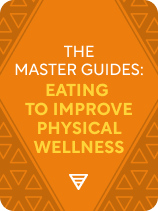

This article is an excerpt from the Shortform book guide to "The Master Guides: Eating to Improve Physical Wellness" by Shortform. Shortform has the world's best summaries and analyses of books you should be reading.
Like this article? Sign up for a free trial here.
Why does eating more plants lead to better health? What specific nutrients in plant foods help prevent disease?
The benefits of a whole-food, plant-based diet extend far beyond basic nutrition. From omega-3 fatty acids to beneficial microbes, plants provide unique compounds that support brain function, reduce inflammation, and strengthen the immune system.
Read more to discover how simple food choices can transform your health for the better.
The Benefits of a Whole-Food, Plant-Based Diet
First, we’ll explain what experts mean when they talk about “whole foods” and “plant-based,” and then we’ll look at the benefits of a whole-food, plant-based diet.
The term “whole food” refers to a food that’s undergone minimal processing or transformation. As a result, it tends to retain more nutrition compared to its more processed counterpart. For example, an apple is a whole food with more fiber and beneficial compounds than applesauce or an apple pie.
Plant-based foods generally include things such as leafy greens, vegetables, and fruit—anything that’s not an animal product (How Not to Die by Michael Greger and The China Study by T. Colin Campbell and Thomas M. Campbell II). While Greger and the Campbells include grains and seeds in their definition of plant-based foods, Michael Pollan (In Defense of Food) sometimes refers to “green plants”—which presumably include only leafy greens and vegetables—in his recommendations.
Greger, Pollan, and the Campbells discuss the benefits of whole-food plant-based diet, arguing that eating primarily these foods decreases your risk of a host of diseases. The benefits include omega-3s, antioxidants, fiber, and beneficial microbes. Let’s take a look at each.
Omega-3s
One of the main health benefits of plant-based whole foods is their omega-3 fatty acids. Omega-3 fatty acids are found in plant leaves and may be the most essential nutrient of all, Pollan writes. They’re important for neurological development and processing, vision, glucose metabolism, and reducing inflammatory responses when needed. In Super Human, Dave Asprey emphasizes that in addition to being anti-inflammatory, omega-3 fatty acids provide the necessary nutrients to form healthy cell linings—which promotes your cells’ ability to extract energy from food and power basic bodily functions. Another way to increase your intake of omega-3s is to eat foods such as walnuts.
Antioxidants
The Campbells elaborate on another beneficial component of plant-based whole foods: antioxidants. Antioxidants are chemicals that give fruits and vegetables their vivid hues (The China Study). They include vitamin C, vitamin E, beta-carotene, and many more compounds. To help you understand the benefits of antioxidants, the Campbells describe what they are and how they work in the body.
Antioxidants are produced by plants during photosynthesis. When a plant converts sunlight to energy, errant electrons can create free radicals, which destroy the plant’s tissues. To protect themselves, plants have evolved electron-scavenging shields made up of antioxidants.
Human bodies also produce free radicals. Sun exposure, pollution, and poor nutrition can all increase free radical levels in our bodies. Free radicals hamper the functioning of our cells and tissues, leading to diverse diseases and health issues such as cancer, cataracts, arthritis, and emphysema. This is also known as “oxidative damage” or “oxidative stress.” Eating foods high in antioxidants can help control the free radicals in your body and reduce their damage.
Greger (How Not to Die) explains that plant foods contain 64 times more antioxidants than animal foods, and according to some research, people who eat the most antioxidant-rich foods have the lowest health risks. He adds that antioxidants from food can even protect against oxidative damage in the brain, inhibiting the formation of the plaques that cause Alzheimer’s.
Greger provides a couple of practical tips for identifying antioxidant-rich foods and increasing your antioxidant consumption: Foods that brown slowly (like mango) have more antioxidants than foods that brown quickly, like bananas. In addition, you can add more herbs and spices to your food, such as oregano and cinnamon, to increase the antioxidants in your diet.
Fiber
The Campbells assert that fiber, which you can get only from plant-based foods, is important because it pulls water into the intestines, keeps things running smoothly in the digestive tract, and absorbs carcinogenic chemicals. As a result, consuming lots of fiber lowers your risk of intestinal cancers. Greger adds that high fiber intake reduces constipation, and according to some research, reduces the incidence of esophageal cancer by one-third.
On the other hand, low-fiber diets cause straining while passing stool. This increases abdominal pressure and can push the stomach out of the abdomen, which can lead to acid reflux and hemorrhoids. Plant-based foods that can add fiber to your diet include legumes—such as beans and peas—as well as fruit.
Beneficial Microbes
Another important component in plant-based whole foods is the beneficial microbes: microscopic organisms that are prevalent in your body, environment, and food. In I Contain Multitudes, science journalist Ed Yong explains that your microbiome—the community of microbes in your body—contributes to a wide range of functions that keep you healthy.
One of the most important functions of microbes in the human body is co-managing your immune system alongside immune cells. Yong explains that microbes tell your immune cells what to respond to and when. Some species of microbes trigger pro-inflammatory responses (when the immune system ramps up its activity) when they detect something harmful, like a virus. Other species trigger anti-inflammatory responses when they detect a harmless microbe. Without anti-inflammatory responses, the immune system would destroy normal cells, leading to inflammatory conditions like inflammatory bowel disease, asthma, and rheumatoid arthritis.
Yong explains that eating plant-based whole foods benefits your microbiome, and by extension, your immune response, in two ways:
1) The beneficial microbes that are present in the food become part of your microbiome.
2) The fiber and other beneficial components in plant-based whole foods provide essential nutrients to the microbes that are already part of your microbiome.
Yong also notes that your microbiome can change drastically within 24 hours, depending on what you eat, so eating diverse plants regularly is the best way to ensure a healthy microbiome. Processed foods and saturated fats, on the other hand, nourish less diverse microbes, and Yong writes that these foods also tend to nourish inflammatory microbes—those associated with the immune system’s overactivity in conditions like asthma and allergies.

———End of Preview———
Like what you just read? Read the rest of the world's best book summary and analysis of Shortform's "The Master Guides: Eating to Improve Physical Wellness" at Shortform.
Here's what you'll find in our full The Master Guides: Eating to Improve Physical Wellness summary:
- The two simple guidelines for eating well
- How to distinguish beneficial foods from harmful foods
- Why supplements aren’t worth it—except in some cases






